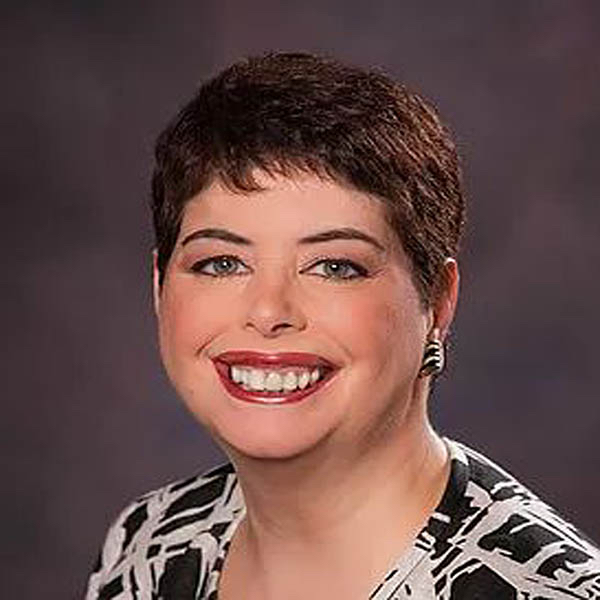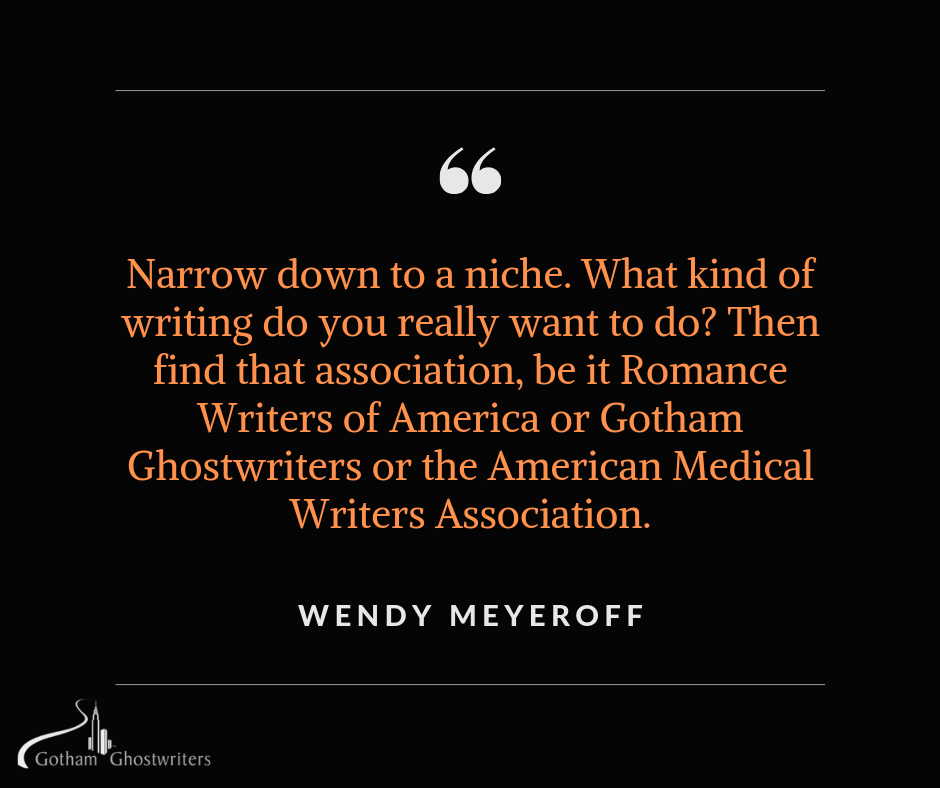
Ghosting expert Wendy Meyeroff has been an award-winning provider of health communications (and science/tech) for 20+ years, first of B2B and then a leader in B2C. Through her WM Medical Communications, (a site she designed and wrote BTW) she’s supplied print, a/v, and online materials for a wide range of clients across the U.S. and beyond, with her extra specialty of writing for/about aging Americans. Among her collaborations: NIH, CBS, Sears, Merck, the American Heart Association, Reader’s Digest, and the American Medical Association. Since 2018, Wendy also co-hosts the Biz side of Partners in Health & Biz, a weekly podcast now entering its eighth year, and is the author of Web 1.0, a book teaching getting back to basics on web content and design. She’s pleased to be a member of Gotham Ghostwriters.
Tell us about your publishing journey. How did you begin writing, and how did you break into the industry?
I fell into writing (unless you count my high school & college English classes). I needed a job, and I got an interview with a trade publishing house. I think I got the job because when I married my hubby, he was a trained optical specialist, and he received a magazine of theirs that covered the industry. So I used to leaf through, and it was sitting on the Editorial Director’s desk when I came for the interview. A comment I made when I saw it got me into a great conversation with the ED, and next thing I knew I was hired.
I spent six years with them moving up the editorial ranks, mostly with biz magazines for health, though I did help launch one of the first covering the then-exploding telecommunications industry. Learned a lot more about researching to get good stats and finding great folks to interview. And this was back in the days (20+ years ago) when the Internet wasn’t as sophisticated.
When did you know you could make a career out of it?
I don’t know that’s what happened. I just kept exploring. The trade gig led to my writing the weekly “Health & Beauty Hotline” consumer column that reached a quarter-million NY-ers. That led to working with Weight Watchers, Good Housekeeping, the Arthritis Foundation, Max Factor, and others on the B2C side.
I went from the trade house to an ad agency and found nope, that ain’t my kind of work. Then I explored PR and found out what the execs kept saying they needed (but didn’t always follow)—that the key to PR placement success is being a great storyteller. Only a tiny agency would hire me, but thanks to my ideas and writing, the PR side of this ad agency rose from six part-time clients to 13 full-time PR clients in my first 16 months there. One of my favorite creations: a press release on “How to Buy a Cane” for a home health product provider. It blasted across the AP wire and got sales inundated with calls.
Tell us (what you can) about your ghostwriting career. How did you get into that practice?
That press release and a 3-part series for a trade magazine were just some of the stories that had the VP/Sales’ byline, not mine.
That and things like white papers, advertorials, blogs… all sorts of things involve ghostwriting. That’s why I’ve been teaching that class; it expands the definition of “ghostwriters” not only among us but to potential clients. I’ve seen GG seeking speechwriters and white paper developers, for example.
That’s why just before I started typing my answers, I was teaching an online course about “Ghosting: Beyond Books.”
What special considerations are required for collaborating on a book—especially with some of the big names you’ve ghosted for?
Most of the folks I’ve ghosted for are not easily recognized names. I have interviewed U.S. Senators (including long-retired New Jersey Sen. Bill Bradley who was also a New York Knicks player) and Bush ’43 when he was promoting the Part D drug plan. I was the PR Director of the NY MacUsers group and met/reported on folks like David Pogue (who’s now a leader in Mac-related books and a CBS reporter) and Guy Kawasaki, who’s now EVERYWHERE.
But the folks who’ve gotten bylines and not just been quoted? Most readers will not know them without looking them up. One of my favorites was (still is) a doc named Gary Applebaum, MD. Gary was a leader in the 80s for establishing one of the first true CCRCs for long-term retirement planning. I worked with that company for 4 years, interviewing Gary, the corporate CEO, and others to develop articles that exploded readership from 1.3 to 3 million in those ages 65+.
Anyway, when Gary decided to run for Congress, he asked for (and company leaders approved) an article for that monthly newspaper’s Health section. So I ghosted a feature offering advice on understanding the Food Pyramid, since most readers had grown up with food recommendations that fit into a square cut into 4 sections.
How do you know if an idea—yours or someone else’s—is strong enough to develop into a book?
I think my journalism training about “So: What’s the Story?” vs. “What are you pitching?” has been key. I know how to develop an editorial calendar, which you can’t do unless you know how to glean insights from sales teams, market research, et al, on who your readership is and what they really want insights on. Add in learning what’s going to make a PR pitch work, and it’s easy to see if a potential client’s idea will succeed as a traditional book or not.
But then—as I just taught in class—there’s the increase in eBooks and books that are self-published. There are times when those can be great alternatives to traditionally published books.
Still, I always warn folks they MUST make sure they’ve gotten help; be it from a ghostwriter, a developmental editor, or good copyeditors. I just received a book this week, about 70 pages. It’s self-published and took two years. Not only should it have taken less time if overseen properly, but it’s RIDDLED with basic mistakes, like “there” instead of “they’re.” Lord!
What does your writing routine look like? How do you stay productive and overcome blocks?
I admit it’s harder to do down here. Forgive me, Baltimore, but a) you don’t have REAL NYC pizza. And b) you need a gosh-darn car to go everywhere. I don’t always feel like driving. And once you walk up/down the block a few times there’s not much to see or do.
So to leave a particular project I may go to other sites. I check LinkedIn and mailings like GG’s… the stuff I LIKE to read… and get some inspiration.
I may also just sit down and read fun books, my greatest love. I adore the JD Robb mysteries, though I admit some of the victims’ descriptions evoke lovely (ahem) images, always fun to see in real work. I make sure NOT to read anything medical since I spend all the rest of day reviewing clinical info either for a current B2B or B2C project or checking out potential new clients.
Or I’m exploring the tons of cookbooks I already have. (I have tons of downloaded/clipped out recipes that still need filing.) Thank God hubby loves to explore new tastes.
I will admit my biggest challenge: too much sitting. In any day, I may be sending out news, updating my mailing list, or doing a thousand things that make me forget the most basic advice of running one’s own biz: Keep moving! Physically.
Did you know a new report for seniors—but one that applies to anyone—says you should at least get off your chair/couch during TV commercials? I tried it recently: It was FOUR MINUTES (can you believe the length of commercial time?!) walking back/forth from the TV area, down our hallway, and back again a few times before the show came back. Trust me; it’s tough if you’ve gotten too used to sitting all day.

What strategies do you focus on when cultivating your platform?
I have a niche specialty: writing for/about older adults (and I count ages 50+, not just 65+). So I get news items from places like MedPage News that provide quick insights into a new Alzheimer’s treatment, or a study on caregiver meltdown, etc. They can either be a news link I send to LI colleagues or inspire a story I post, or maybe even guide me to potential clients.
The news also gives me great ideas for guests for the Partners in Health & Biz podcast, where I’m the biz co-anchor twice a month. I just interviewed a great leader at the Smithsonian about how health/medicine has come together with philanthropy. (It’ll be a May broadcast.)
Posting the news and getting guests are both great ways to enhance recognition.
If you could go back and change anything about your writing career, is there something you would choose to do differently?
I must admit we wouldn’t have left NYC if 9/11 hadn’t happened. I see TONS of opportunities for work/clients there, including far more now in my hometown of Brooklyn. And the great networking! Again, without spending hours in a car it’s harder to do down here.
Still, I’ve consistently explored new writing opportunities as a telecommuter, going from magazines to newsletters… which essentially equals blogs IMHO. I learned PowerPoint slides years ago when I started CME/CE work. Thanks to podcasting, I’ve gotten to be a bit of a broadcaster, not just dialing in but actually editing audio. (At least the basics.) I’ve been in social media over a decade now.
I’d guess webinars, eBooks, and infographics are my latest skills.
So I love it all. It’s something new every day.
What’s your best piece of advice for someone looking to be a full-time writer (ghosting or otherwise)?
Most of all, link up with other writers. First, it could be groups with a broader base, like the Editorial Freelancers Association. EFA has writers (and editors and others) in fiction/non-fiction; health materials, academic papers, IT manuals… the list continues. You can start by just reading insights on our Yahoo site and then of course actually join. (It’s www.the-efa.org.) I’m the co-chair of the Maryland chapter handling Baltimore/Balt. County meetings so sign on if you want meeting announcements.
Then narrow down to a niche. What kind of writing do you really want to do? Then find that association, be it Romance Writers of America or GG or the American Medical Writers Association.
Then you can network, in-person or online. And never stop learning.
What are you working on next?
Well, there’s the podcast I just mentioned. TONS of fun!
Also, I’m helping a client update his website. I started web work very early one and so have done both this site’s content and even actual web design twice now, as his provider changed templates. (My own site—www.wmmedcomm.com—I designed/wrote in Wix.)
He’s just found out he has to modify certain things due to legalese the company management is updating. Last rewrite, he was the first client that wanted vid included. Thank God the net lets you find help so easily. By the time folks read this we may be done and I could send you the link.
Do you have a story idea? Pitch it to us below, and we’ll work to match you with a writer like Wendy who can help you bring your story to life.
